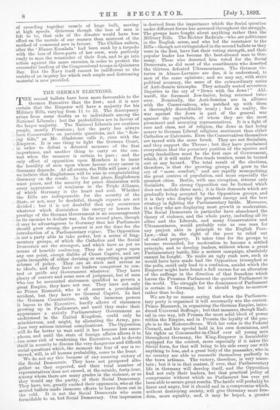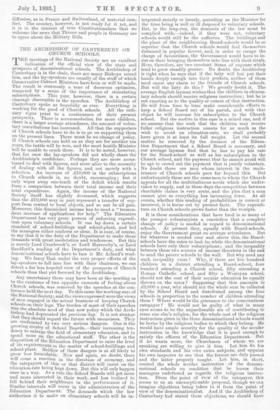THE GERMAN ELECTIONS. T HE second ballots have been more favourable
to the German Executive than the first ; and it is now certain that the Emperor will have a majority for his Military Bills, varying from 11 to 33. The discrepancy arises from some doubts as to individuals among the National Liberals ; but the probabilities are in favour of the larger majority. The National Liberals are cautious , people, mostly Prussians; but the party has always been Conservative on patriotic questions, and the "flow- ing tide," as Mr. Gladstone calls it, runs with the Nmperor. It is one thing to fight the German Court, , in order to defeat a detested measure of the first importance, and another thing to carry on the con- test when the measure is certain to pass ; and the only effect of opposition upon Members is to incur the hostility of men upon whose favour every career in Germany depends. At all events, the Bills will pass ; and we believe that Englishmen will be wise in congratulating Germany on the result. In the first place, Englishmen want peace, and the security for peace diminishes with every appearance of weakness in the Triple Alliance, of which Germany is the heart and soul. Whether the Bills are indispensable for the security of the • State, or not, may be doubtful, though experts are not divided ; but it is not doubtful that any occurrence whatever which diminishes the energy or lowers the prestige of the German Government is an encouragement to its enemies to declare war. In the second place, though it may be advantageous to Germany that her Parliament should grow strong, the present is not the time for the introduction of a Parliamentary regime. The Opposition .,is not a party able to take power, but a series of frag- mentary groups, of which the Catholics and the Social Democrats are the strongest, and which have as yet no means of heartily coalescing. They do not agree upon any one point, except dislike of Count Caprivi, and are quite incapable of either devising or supporting a general scheme of policy. They are at sixes and sevens as to ideals, and they have no leaders competent to con- trol or guide any Government whatever. They have plenty of orators and some men of judgment, but of men who can be accounted statesmen qualified to govern a great Empire, they have not one. They have not only no Prince Bismarck, who is of course a providential accident, but they have no General Caprivi. In fact the German Constitution, with the immense powers it leaves to the Executive, hardly allows of statesmen growing up in Parliament, and until they make their appearance a strictly Parliamentary Government as understood in the United Kingdom, could only be mischievous, and might, by alienating the Army, pro- . duce very serious internal complications. The Opposition • will do far better to wait until it has become less amor- phous, and until the state of foreign affairs allows it to run some risk of weakening the Executive, and to devote • itself in security to discuss the very dangerous and difficult social' questions which, the moment the fear of war is re- moved, will, in all human probability, come to the front. We do not say this because of any amazing victory of the Social Democrats. They have not prospered alto- gether as they expected, and their total number of representatives does not exceed, at the outside, forty-four, among whom there are many grades in the violence, or as they would say the purity, of their Social Democracy. They have, too, greatly excited their opponents, who at the second ballots made immense efforts to leave them out in the cold. It is not the Social Democrats who seem formidable to us, but Social Democracy. Our impression is derived from the importance which the Social question under different forms has assumed throughout the struggle. The groups have fought about anything rather than the Military Bills. The Richter Radicals—who are politicians in the English sense, and who led the resistance to the Bills—though not extinguished in the second ballots as they were in the first, have lost their voting strength, and their popular leader has become tha best-abused man in Ger- many. Those who deserted him voted for the Social Democrats, as did most of the constituents who deserted the thirteen defeated Ultramontanes. The German vic- tories in Alsace-Lorraine are due, it is understood, to men of the same opinions ; and we may say, with strict political accuracy, the same of the extraordinary series of Anti-Semite triumphs. They actually seated seventeen Deputies to the cry of "Down with the Jews !" Ahl- wardt, the foremost Jew-baiter, being returned twice over. Nominally, the Anti-Semites are in alliance with the Conservatives, who patched up with them a thoroughly discreditable treaty ; but in reality, the war against the Jews is part of the general war against the capitalists, of whom they are the most prominent and annoying representatives. It is a fight of race and class, not of religion, the Jews in fact being nearer to German Liberal religious sentiment than either Catholics or Calvinists. Even the Conservatives themselves are tarred with the same brush. They are not Socialists, and they support the Throne ; but they have proclaimed everywhere that the pecuniary position of the squires and petty freeholders must be the first care of Government, which, if it will make Free-trade treaties, must be turned out at any hazard. The total result of the elections, therefore, is that the growing groups all grow to the cry of "more comfort," and are rapidly monopolising the great centres of population, and more especially the greatest cities. Berlin, with one exception, returns only Socialists. No strong Opposition can be formed which does not include these men; it is their demands which are gradually being accepted by the Opposition groups, and it is they who display the greatest energy and the best strategy in fighting the Parliamentary battle. Moreover, it is they who are displaying most growth in moderation. The Social Democrats in particular have abandoned the theory of violence, and the whole party, including all its allies and. the Liberals, and many Conservatives and Ultramontanes would probably vote as one man for any project air' in principle to the English Poor- Law,—that is, the right of the poor to relief out of realised property. It takes time for the groups to become reconciled, for moderation to become a settled principle, and to develop leaders, without whom a great Parliamentary battle, like a serious campaign, absolutely cannot be fought. To make an ugly rush now, such as would have been made had the Opposition triumphed at the polls, could only lead to a confusion, amidst which the Emperor might have found a full excuse for an alteration of the suffrage in the direction of that franchise which leaves the Prussian Parliament the quietest Parliament in the world. The struggle for the dominance of Parliament is certain in Germany, but it should begin to-morrow rather than to-day. We are by no means saying that when the Parliamen- tary party is organised it will necessarily win the contest. Prince Bismarck, in organising the German Empire, intro- duced Universal Suffrage ; but that measure, though Radi- cal in one way, left Prussia the most solid block of power within the Empire, and in Prussia the loyalty of the peo- ple is to the Hohenzollerns. With his votes in the Federal Council, and his special hold in his own dominions, and his rights as Commander-in-Chief over all young men throughout Germany, the King-Emperor is formidably equipped for the contest, more especially if it takes the Social form, for that will bring to his side every one with anything to lose, and a great body of the peasantry, who in no country are able to reconcile themselves perfectly to the town artisans. The victory, therefore, is very uncer- tain; but it is in that contest, if ever, that Parliamentary life in Germany will develop itself, and the Opposition find not only their leaders, but that practical policy of compromise without which no Parliament has ever yet been able to secure great results. The battle will probably be fierce and angry, but it should end in a compromise which, without destroying society, will give Germany more free- dom, more equality, and, it may be hoped, a greater diffusion, as in France and Switzerland, of material com- fort. The country, however, is not ready for it yet, and it is in the interest of true Constitutionalism that we welcome the news that Throne and people in Germany are to agree about the Military Bills.











































 Previous page
Previous page